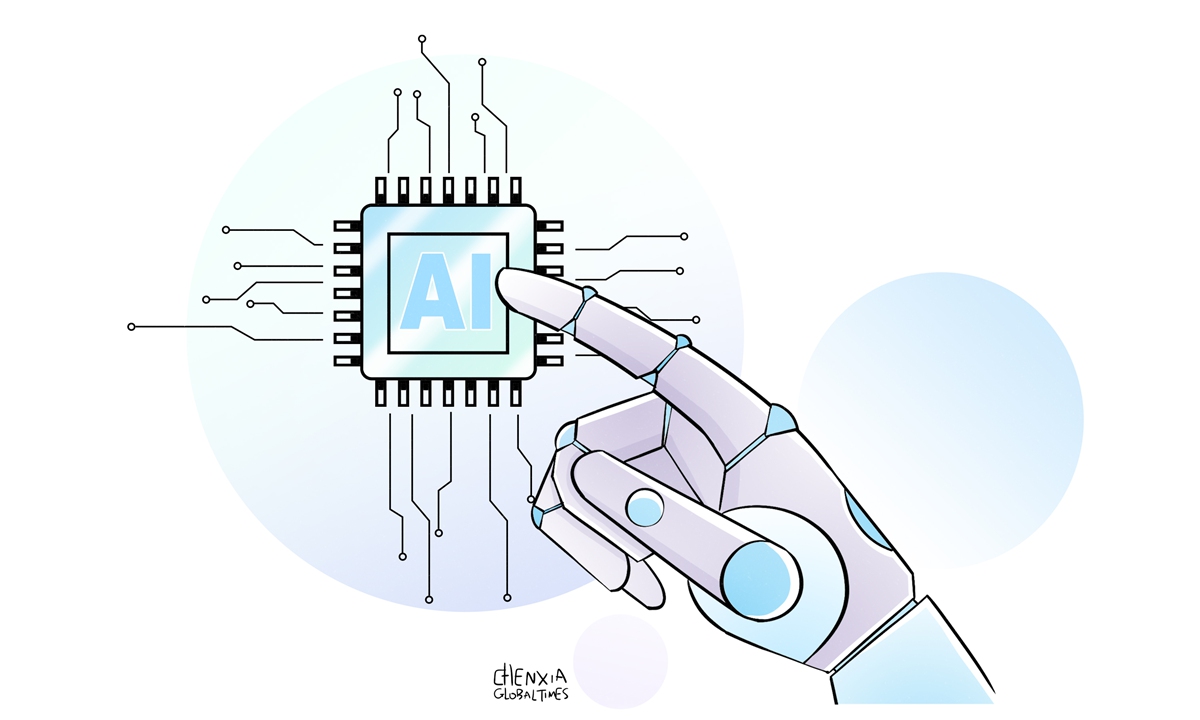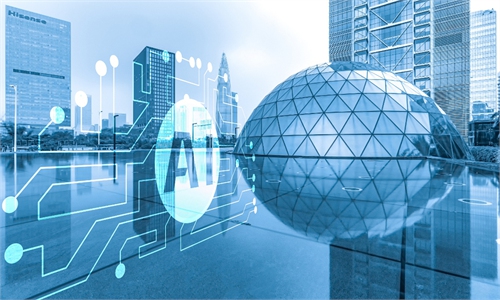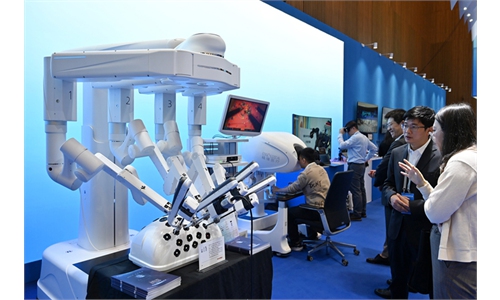
Illustration: Chen Xia/Global Times
Generative artificial intelligence (AI) is rapidly emerging and shaking up the world like few things before. Global businesses, led by big tech companies, are racing to train their AI models with vast amounts of data and carefully crafted algorithms in their urgent efforts to develop innovative tools that will transform their production or service models to outperform their competitors.The latest generative AI applications can perform a range of routine tasks, such as reorganizing and re-categorizing data. But it is their ability to understand human language, write text, compose music, create digital art, and produce increasingly long visual-stream clips and movies that has garnered headlines all over the world.
AI technology is praised for its potential to reshape traditional ways that manufacturing is performed and business is done, and create trillions of dollars in economic value over the coming years. Analysts predict that AI will contribute more than $15 trillion to the global economy by 2030.
If the disruptive technology is applied across the economy, labor productivity will be significantly lifted through advanced AI-enabled automation in each segment of manufacturing and commercial services, such as education, entertainment, banking, insurance and health care. Aided by the technology, governmental work efficiency will be greatly improved too.
Take health for example, AI-powered diagnostics could use a patient's past medication history as a reference to identify small deviations that may indicate a health condition, prompting immediate clinical investigation and timely treatment. It will augment physicians' diagnoses, and provide valuable insights for the AI to continuously learn and improve. The close interaction between human physicians and the AI-powered diagnostics will enhance the accuracy of an AI system and, over time, provide enough confidence for humans to delegate the task entirely to AI.
According to scientists, with improved AI innovation, there is potential to automate work activities that could save 60-70 percent of an average employee's work time. The continuous acceleration in the potential for rapidly rising automation is largely due to generative AI's increased ability to understand human languages. Generative AI has a greater impact on knowledge work associated with occupations that have educational requirements than on other types of work, such as education, literature, legal service, medical care and entertaining art.
Research studies also show that AI will stimulate higher consumer demand and more efficient logistics, because the technology serves to drive a greater variety and better classification of products and services that are tailored and automatically sent to individual consumers. Retail promotion is likely to become more personalized, taking into account of everyone's consumption habits, and specific product or service affordability.
Increasingly, governments have vowed to place AI-powered innovation and applications high on their agenda. Some Western governments, like the Biden administration, have implemented highly restrictive trade measures to prevent high-end AI semiconductor chips from being exported to other countries. This is done in order to maintain their advantage in AI innovations and keep other countries from catching up.
Since AI will be the next key driver of industrial and societal transformation, global tech giants are jostling to gain an upper hand in competition and future market share. In the latest development, Apple is in discussions with Google on using its generative AI model called Gemini to arm its next generation of iPhones and other devices. Apple is rushing to adopt this technology, which has caused a stir in the tech industry.
Boosted by the rocketing market demand for cutting-edge semiconductor chips driving the AI revolution, Nvidia's share prices are up more than 250 percent in the past 12 months, and Nvidia has become the third US firm with its market valuation exceeding $2 trillion after Apple and Microsoft. Companies like OpenAI, Meta and Google are in need of tens of thousands of Nvidia's AI chips to power products such as Sora, Copilot and Gemini.
The AI wave looks unstoppable now. In the past several months, generative AI chatbots have picked up tens of millions of users around the world. For instance, OpenAI's ChatGPT boasts 180 million users.
Apple's delay in releasing a highly-performing AI product has been costly. After a decade-long run as the world's most valuable public company, it was dethroned earlier this year by Microsoft, which owns a big stake in OpenAI and has aggressively pursued its own AI innovations.
Similar to their American counterparts, Chinese technology companies are also busy in training their AI models which are increasingly being tested in a broad variety of use scenarios. Chinese AI front-runners are now leading in autonomous driving, enterprise call-center service, a flurry of automated financial, educational and hospital services as well as logistics, as generative AI-powered chatbots can access and process vast amounts of information to answer customer queries, promptly and accurately. The technology is indisputably a premium part of the government's push to propel new quality productive forces in China.
Generative AI has the potential to significantly change the nature of work across various industries and fields. The impact of generative AI on human work will depend on how it is implemented, regulated, and integrated into various industries, businesses and organizations. A full realization of the technology's benefits will take some time, which also includes managing the risks to be brought by AI.
The author is an editor with the Global Times. bizopinion@globaltimes.com.cn


